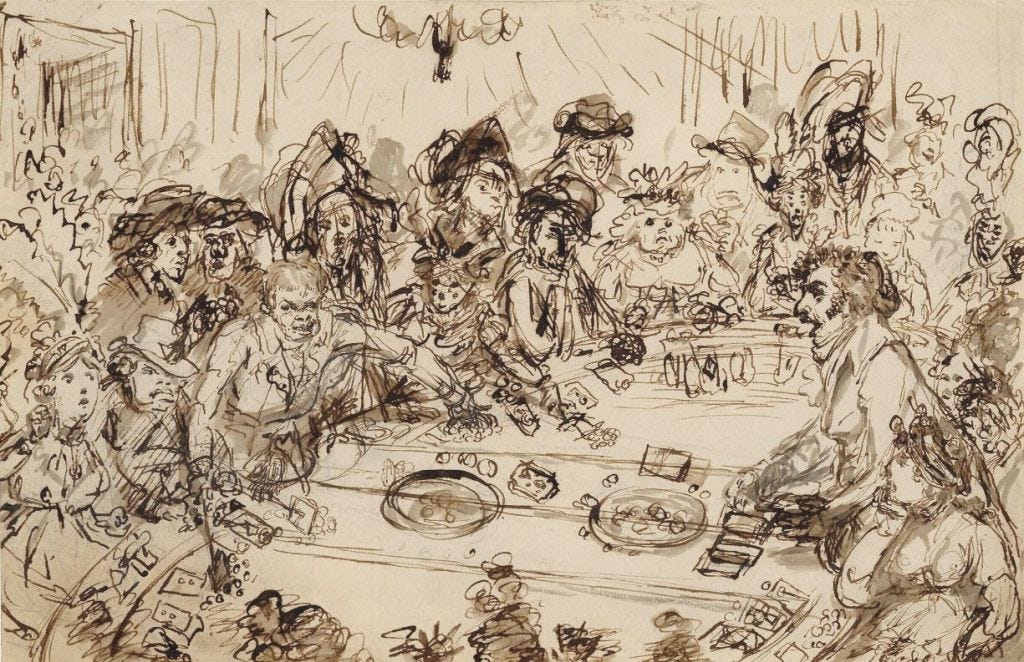Not bound for Botany Bay
Henry Weston was hanged for forgery in 1796 not transported to Australia
One of my first cousins five times removed was Henry Weston (1773-1796), a gambler and ne’er-do-well, hanged for forgery at a young age.
He was born in 1773 in Clonmel, County Tipperary, fourth son of Thomas Weston, an attorney, and Dorothea Weston nee Orfeur. I know very little about his early life.
In 1791, at the age of eighteen, Weston attended Trinity College, Dublin, and presumably this means he showed some talent for learning, but he had defrauded his father and uncle of several sums of money and he found it prudent to remove himself to London. There he obtained a position as a clerk with a friend of his father’s, Thomas Cowan, a military agent, of Ely Place.
Thomas Weston alerted Cowan to the theft, telling him that Thomas was not to be trusted, but Cowan undertook to give him a second chance.
Cowan had considerable money dealings, and Henry Weston, who quickly became a valued employee, was given more and more responsibility for them.
In 1794 Thomas Cowan went abroad for some months, leaving Weston in sole charge of his agency. The young man, only just twenty-one, began to frequent a gaming-house in Pall Mall. Commencing with trifling bets at the faro and hazard tables, he increased his stakes to large amounts. He was soon losing heavily, and the money that he lost was not his own.

Because of the position of his firm he was able to obtain unlimited credit. “The different brokers, jobbers, and lottery-office keepers to whom he resorted, knowing the respectability of his principal, Mr. Cowan, used to take his word currently, and he had only to mention the names of stock, scrip, tickets, or loan to be immediately supplied.” In addition to playing at the tables he speculated in the “Alley” (the stock exchange), but he met with no success, and was tempted to embezzle still more in the hope that his ill-luck would change. He sold stocks and shares belonging to clients under a forged power of attorney. Even after his employer had returned to England he continued his speculations. He squandered at least £50,000, and it was said that his thefts possibly amounted to twice the sum, tens of millions of present-day pounds. One of his victims was his cousin, Hugh Palliser Walters, who lost £7000 to him.
Weston’s crimes came to light in April 1796 when a major fraud against General Patrick Tonyn was uncovered. Tonyn was a British Army officer and colonial administrator who served as the governor of East Florida from 1774 to 1784 during the American Revolutionary War; East Florida being a Loyalist stronghold during the conflict.
General Tonyn held £16,000 worth of Government 3 per cents (bonds). Weston had appropriated the whole of this stock under two forged powers of attorney in General Tonyn’s name, one in July 1795 for £11,000 and the other in January 1796 for £5000. He robbed the general’s sister in a similar manner. As in all these transactions, he had paid the interest when it became due and was prepared to reinvest the capital by robbing someone else, but on this occasion he was unable to arrange the readjustment in time. General Tonyn sent a broker to the bank unexpectedly to make inquiries about his investments, and, although Weston attempted a plausible subterfuge when asked to explain, he was told that the matter must be thoroughly investigated
Realising that all was lost, Henry absconded. He got as far as Liverpool but was arrested by two Bow Street runners while waiting to board a ship bound for America. He attempted suicide on the journey back to London.
In May 1796 Weston was tried at the Old Bailey, the case attracting a great amount of public interest. Found guilty of forgery, he delivered a remorseful speech, acknowledging his guilt and warning others against gambling and entrusting youth with too much responsibility.
Despite efforts to secure a reprieve, on 6 July 1796 Weston, twenty-three years old, was hanged outside Newgate Prison. John Roberts, also known as Colin Reculist, aged thirty-five, who had been convicted of forging a £5 note, was hanged with him.
Related posts and further reading
Admiral Sir Hugh Palliser, 1st Baronet (1723 – 1796): Henry Weston of Ely Place, London, son of Thomas Weston, was mentioned in a 1793 codicil to the will of Sir Hugh Palliser.
Bleackley, H., Notable British Trials: Trial of Henry Fauntleroy And Other Famous Trials for Forgery. 1924 pages 207-211 discusses Henry Weston
Old Bailey Proceedings Online (www.oldbaileyonline.org, version 9.0) May 1796. Trial of HENRY WESTON (t17960511-27). Available at: https://www.oldbaileyonline.org/record/t17960511-27
There are numerous newspaper reports at the time. A few:
The Derby Mercury 21 April 1796: Henry Weston apprehended by the Bow Street runners
Jackson’s Oxford Journal 30 April 1796: Weston examined privately at Bow street, he was found to have forged two powers of attorney both purporting to be the powers of Patrick Tonyn. He was committed but remained at Carpmeal’s house (Thomas Carpmeal, or Carpmael, was a Bow Street Runner).
The Times 16 May 1796: report of Weston’s trial at the Old Bailey
Jackson’s Oxford Journal 9 July 1796: Execution of Henry Weston
The Bath Journal 18 July 1796: Memoirs of Henry Weston Lately executed for Forgery
The Bath Journal 25 July 1796: Copy of a letter sent from the unfortunate Weston to the Prince Of Wales, a few days before his execution
Wikitree: Henry Weston (1773-1796)
This post first published at https://anneyoungau.wordpress.com/2025/07/06/not-bound-for-botany-bay/


Clearly a gambling addiction had Henry in its grip. I can see why he was hanged given the laws of the day and the large amount he stole. But, poor John Roberts hanged for £5. I wonder if his case had been tried at a different time (and not in the shadow of Henry's theft of a huge amount), whether John would have gotten off more lightly ... transportation for example.